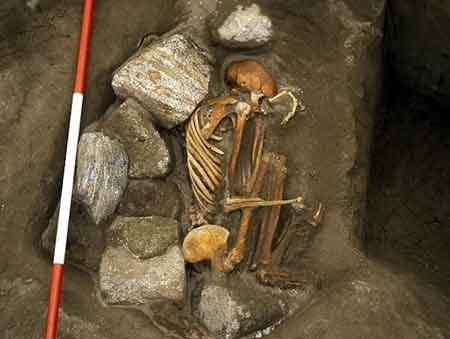當(dāng)前位置: Language Tips> 雙語(yǔ)新聞
分享到
 |
|
A pair of 3,000-year-old mummified corpses that were recently discovered in Scotland are actually composed of body parts originating from six different people. |
|
Researchers say that a pair of 3,000-year-old mummified corpses that were recently discovered in Scotland are actually composed of body parts originating from six different people. The mummified corpses were discovered in Cladh Hallan, an archaeological site on the island of South Uist in the Outer Hebrides in Scotland. It is the only location in Great Britain where prehistoric mummies have been discovered. National Geographic reports that isotopic dating and DNA experiments revealed the unusual pairing of body parts. The tests also revealed that the body parts were assembled and buried together more than 600 years after death, meaning that the assemblage was almost certainly deliberate. But lead researcher and University of Manchester professor Terry Brown says the answer could be simple and somewhat morbid: The original body parts may have simply been plugged in as a convenience to replace missing pieces. "Maybe the head dropped off and they got another head to stick on," he said. Meanwhile, fellow researcher and University of Sheffield professor Mike Parker Pearson tells LiveScience the parts could have been more specifically put together to show the connected lineage between families other time. "Rights to land would have depended on ancestral claims, so perhaps having the ancestors around 'in the flesh' was their prehistoric equivalent of a legal document," Parker Pearson said. "Merging different body parts of ancestors into a single person could represent the merging of different families and their lines of descent," Parker Pearson said. Brown tells National Geographic he believes researchers will discover more composite-like bodies on the island. In fact, he said such mummified corpses may have already been discovered but can only be verified by comparing the DNA of various body parts. (Read by Nelly Min. Nelly Min is a journalist at the China Daily Website.) (Agencies) |
研究人員日前表示,近來(lái)在蘇格蘭出土的兩具3000年前的木乃伊是由六具尸體的不同部位“組裝”而成的。 研究人員在蘇格蘭外赫布里底群島的南尤伊斯特島的一處考古遺址發(fā)現(xiàn)了這兩具木乃伊。這是英國(guó)史前木乃伊的唯一一處發(fā)現(xiàn)地。 據(jù)《國(guó)家地理雜志》報(bào)道,同位素定年和DNA檢測(cè)結(jié)果顯示,這兩具木乃伊的身體部位“不尋常”。檢測(cè)顯示,在死后600多年,尸骸與其他死者的部分軀體“組裝”成一副完整尸體,繼而掩埋,這意味著幾乎可以肯定地說(shuō),這種“組裝”是故意的行為。 研究負(fù)責(zé)人、英國(guó)曼徹斯特大學(xué)教授特里?布朗說(shuō),答案可能“簡(jiǎn)單卻恐怖”:原始的身體部位被“組裝”可能就是為了補(bǔ)上缺損的部分。 他說(shuō):“可能原尸體的頭遺失了,有人給它找另一個(gè)頭安上。” 研究人員、英國(guó)謝菲爾德大學(xué)教授邁克?帕克?皮爾遜告訴《生活科學(xué)》,在當(dāng)時(shí)的年代,特定的尸體“組合”可能與家族血緣有關(guān)。 帕克?皮爾遜說(shuō):“對(duì)土地的所有權(quán)可能與祖先的所有權(quán)有關(guān),因此有祖先‘親自’在身邊等同于史前的一種法律證明。” “將幾位祖先不同的身體部分組合在一起能夠代表不同家族以及后代的融合。” 布朗告訴《國(guó)家地理雜志》,他相信研究人員可能在該島發(fā)現(xiàn)更多“組裝”木乃伊。他認(rèn)為類(lèi)似的木乃伊之前就被發(fā)現(xiàn)過(guò),但只能通過(guò)對(duì)比身體不同部位DNA的方式加以鑒定。 相關(guān)閱讀 (中國(guó)日?qǐng)?bào)網(wǎng)英語(yǔ)點(diǎn)津 Julie 編輯:陳丹妮) |
|
Vocabulary: morbid: 恐怖的 |
分享到
關(guān)注和訂閱


口語(yǔ)
關(guān)于我們 | 聯(lián)系方式 | 招聘信息
電話(huà):8610-84883645
傳真:8610-84883500
Email: languagetips@chinadaily.com.cn